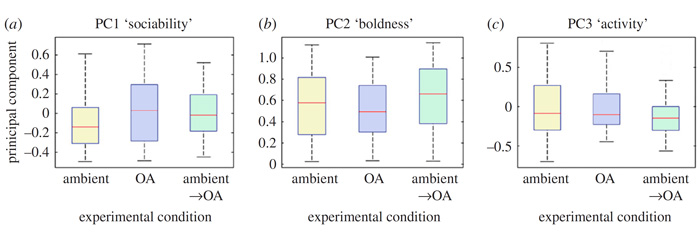| Follow @co2science |
Paper Reviewed
Duteil, M., Pope, E.C., Pérez-Escudero, A., de Polavieja, G.G., Fürtbauer, I., Brown, M.R. and King, A.J. 2016. European sea bass show behavioral resilience to near-future ocean acidification. Royal Society Open Science 3: 160656.
The European sea bass (Dicentrarchus labrax) is a commercially important fish species with a global production value of over $1 billion (USD) annually. Given such economic and dietary prominence, this species has caught the attention of researchers who are interested in how it may respond to future projections of so-called ocean acidification (OA) to both producers and consumers, ergo the recent study of Duteil et al. (2016).
Writing as background for their work, the team of seven scientists note how there is "a collective drive in the scientific community to better understand how future OA may impact upon marine fisheries and ecosystems," adding that it is "critical to investigate the behavioral effects of near-future oceanic conditions, using robust and relevant experiments to inform management strategies" (emphasis added).
Robust and relevant experiments, however, do not always find their way to the published literature. As an example, Duteil et al. lament how some OA studies will expose marine species to an acute or immediate change in seawater pH and then look for a measured behavioral response. Such experiments, they say, provide "interesting case studies which add to our understanding of behavioral responses to rapid environmental change, but their ecological relevance to real-world OA is not always clear."
In an effort to avoid such unrealistic and problematic experimental design, Duteil et al. set out to conduct the "most comprehensive study of its kind to date" on the behavior of sea bass to future projections of OA. They accomplished their objective by incubating fertilized European sea bass eggs in seawater of ambient (585 µatm pCO2) or enriched (1000 µatm) pCO2 and then reared them in this environment up through the early juvenile stage. Then, between day 59 to 68 of development, they conducted a series of analyses on (1) fish activity (median speed and proportion of time spent still), (2) reaction to the testing environment (proportion of time spent near the edge of the tank, time taken to explore 10 percent of the tank, and overall percent of area explored), and (3) association with other fish (median distance to the nearest neighbor and mean number of local neighbors). These analyses were performed on fish reared in ambient and enriched pCO2 seawater, and for a third category of fish that were reared in ambient seawater, but placed in enriched pCO2 seawater during the testing phase.
So what did the authors learn from their experiment?
In the words of Duteil et al., results of the analysis revealed that the fish "showed statistically similar movements, interaction with the environment, and interaction with each other, regardless of [rearing or treatment condition]" (see figure below). Such findings, they note, indicate "behavioral resilience to OA," adding that "for an obligate schooling migratory fish like sea bass, our finding is good news, and suggests that we can be optimistic about their ability to cope with anthropogenic changes to the environment in the near future."
So why aren't all the climate and ocean acidification alarmists rushing to report this good news? Chances are, this is the first and only place you will learn about it. And that is a sad commentary on their intent to keep the public from hearing about news that conflicts with their narrative.

Figure 1. Behavioral resilience to near-future ocean acidification. Data variables extracted from tracked fish trajectories were normalized by the authors and combined into principal components. Linear mixed models revealed that treatment type does not predict variation in (a) PC1 'sociability', (b) PC2 'boldness' or (c) PC3 'activity'. Source: Duteil et al. (2016).




